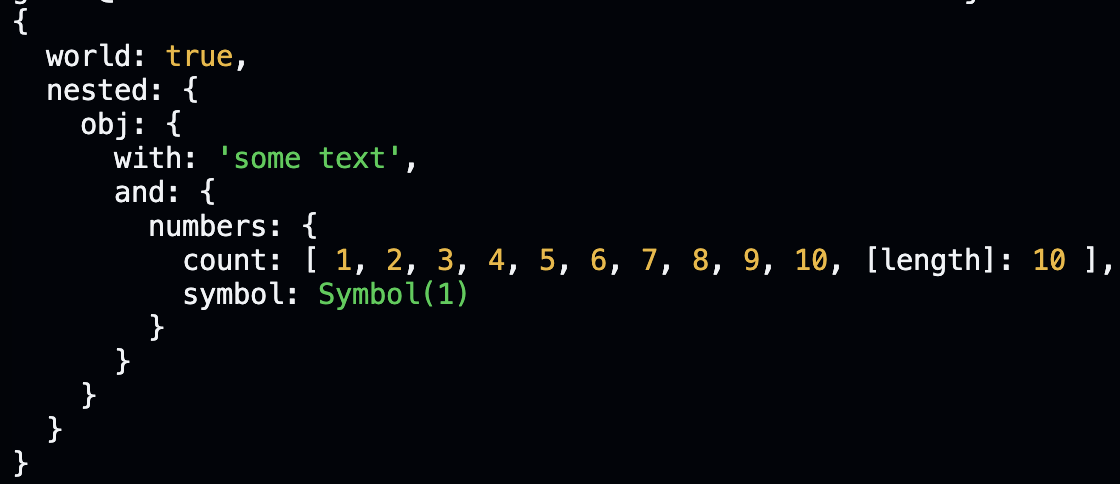NodeJS: Using console.dir() over console.log() with deeply nested objects.
 Gemma Black
Gemma Black
console.dir() seems rather redundant. At least with console.log(), you can add as many arguments as you want, but with console.dir(), you can only log one.
Despite that, for debugging, I'll be using console.dir() more in future. Here's why?
Let's take a deeply nested object.
let hello = {
world: true,
nested: {
obj: {
with: "some text",
and: {
numbers: {
count: [1,2,3,4,5,6,7,8,9,10],
symbol: Symbol("1"),
}
}
}
}
}
console.log() to debug
Now, if you do a pure console.log:
You'll be missing some of the properties that are past a certain depth.
The output is on a single line and not structured in an easily readable way.
# console.log(hello)
{ world: true, nested: { obj: { with: 'some text', and: [Object] } } }
console.log() to get the whole object
How I'd normally get around expanding that [Object] is using trusty old JSON.stringify. And voila 🎉! We have the entire object displayed.
# console.log(JSON.stringify(hello))
{"world":true,"nested":{"obj":{"with":"some text","and":{"numbers":{"count":[1,2,3,4,5,6,7,8,9,10]}}}}}
console.log() but pretty
While we could see the entire object before, it's not easy to read. We can fix that by using the JSON.stringify formatting argument:
# console.log(JSON.stringify(hello, null, 2))
{
"world": true,
"nested": {
"obj": {
"with": "some text",
"and": {
"numbers": {
"count": [
1,
2,
3,
4,
5,
6,
7,
8,
9,
10
]
}
}
}
}
}
And this is much better, but it still isn't great. Look at that array! That's equally impractical.
console.dir() for better readability
Now, compare all that hard work with console.dir. You have to add the depth you want to be printed to get the entire object out.
console.dir(hello, { depth: 99 })
And it looks like this:
{
world: true,
nested: {
obj: {
with: 'some text',
and: {
numbers: {
count: [
1, 2, 3, 4, 5,
6, 7, 8, 9, 10
],
symbol: Symbol(1)
}
}
}
}
}
It has nice terminal colours because it's not JSON. It's Javascript! It benefits from the conciseness of javascript and is more compact and yet more readable.
Getting a little more out console.dir()
There are three options you can pass into the formatting argument with console.dir(). We've already covered depth so we'll skip that.
console.dir(hello, {
showHidden: true,
depth: 99,
colors: true
})
showHiddenallows you to see Javascript annotations such as the length of an array.
{
...
count: [ 1, 2, 3, 4, 5, 6, 7, 8, 9, 10, [length]: 10 ],
...
}
colorsby default istrue(for me) in the terminal, but you can turn it off if you want. I find the colouring helpful though:

There's nothing more to say really. As I'm reading the Nodejs and finding little gems to make life a little easier. Maybe it's helpful to you.
Subscribe to my newsletter
Read articles from Gemma Black directly inside your inbox. Subscribe to the newsletter, and don't miss out.
Written by

Gemma Black
Gemma Black
I'm a Senior Software Engineer. With 10+ years working within tech teams, and 20+ years working with code, I develop across the stack, assisting with application design, maintenance, deployment and DevOps within the AWS Cloud.